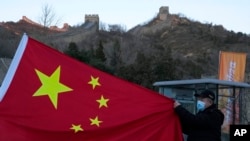Working with the famous Chinese dissident Harry Wu, long-term China observer Orville Schell first encountered forced labor in China three decades ago. Pretending to be a businessman interested in items for export to America, Wu and reporters from the CBS News show 60 Minutes shot hidden camera footage of prisoners forced to make the products.
More recently, China has repeatedly denied the current use of Uyghur forced labor; evidence continues to point to the contrary.
Last month, Schell brought the issue to the fore again when The Wire China published an article, Changeless China?, based on an edited version of Schell's diary from that investigation with Wu.
VOA Mandarin spoke with Schell about what's happening today in China. The interview has been edited for length and clarity.
Q: What you did with CBS in 1991 is so impressive and unthinkable.
A: You couldn't do it today. You wouldn't even get off the plane. It's unthinkable. You can understand why the Communist Party under (President Xi Jinping) increased control, because they're aware that if they don't control everybody in China and foreigners outside China as well, they will start doing things like this. They are becoming more savvy, and the logic of their savviness is more control.
Q: China has been accused of committing crimes against humanity and possibly genocide against the Uyghur population in Xinjiang. What do you think of it being described as "genocide"?
A: I don't particularly like the use of the word "genocide." I don't think it describes what's actually happening. Genocide does so irrevocably (go) back to the Holocaust in Europe during the '30s and '40s.
I think what's going on in Xinjiang is quite different, not less pernicious in a way. But it has less to do with actually killing people, as the Germans did in the labor camps, and more to do with something that is very uniquely Chinese Communist, namely trying to change the thinking, religion, the cultural habits of the Uyghurs, the Muslims, the other minority in China.
That is a new kind of technocracy, which we are not familiar with. It's very uniquely Chinese. It needs a new name. I think it's very dangerous, and (it) certainly violates many fundamental principles of individual rights that liberal democratic countries cherish, but it is not a cutout of Holocaust and genocidal experiences we've seen in Rwanda, Armenia and Europe.
Q: Do you think China's Xinjiang policy is effective?
A: Will this kind of techno autocratic "thought reform" and detention sort of experience work? I don't know the answer to that. It probably will work in the short run. Whether it'll work in the long run is another question.
Because if you believe as I do, human beings fundamentally would like to have lives as free as possible within a reasonable social contract. Then you have to assume what's going on in Xinjiang is really making people unhappy. Everybody is scared.
And that is the power of the Chinese Communist Party – people are scared. They don't want to talk out, they don't want to get in trouble. But history shows that governments that rule by fear rather than by assent tend to be short-lived and not tremendously durable.
Q: It's difficult for the outside world to get the full picture in Xinjiang, especially on forced labor.
A: It's doubly difficult because what the Chinese Communist Party is doing is not transparent.
I think some camps are closing down, I think there are people who were released last year.
I think the Chinese Communist Party does listen to what foreigners say, what the foreign media says, foreign governments say. But on the other hand, I think they're very reluctant to let go of these tools of control.
This is what the Communist Party knows how to do. If there is a problem, control is always the answer.
Q: Do you think what's going on in today's China is inevitable? How much does it have to do with the current leadership's own mindset?
A: I think it certainly has a lot to do with the character and logical nature of Xi Jinping. He was a child of the Cultural Revolution, and we now get a return to the past.
He never went abroad, doesn't speak a foreign language, does not feel comfortable with foreign companies. He is not a cosmopolitan person. He is very insecure, very insular, he's very "tu." ("unsophisticated" in Mandarin Chinese)
So he didn't want to become absorbed into the global order. He wanted to go above it. Xi Jinping just happened to come at a time China did have acquired sufficiency and power.
Q: Are you optimistic at all looking at where China is going now?
I feel, having watched (China) for a long, long time – I first started studying (it) in the late 1950s – I feel (Xi's failure to adapt to change) is one of the greatest tragedies in modern history.
China, just as it gained the power and wealth, and the influence, the ability to be respected by the world, instead of joining the world order, and enjoying this immense success that Chinese people have accomplished, it is now making everybody feel uncomfortable, it's antagonizing one country after another, and it's rallying all of the states in Asia into a very serious tension, and possible military clashes toward a war. That is one of the great tragedies of any country in the past century, particularly in Asia.




